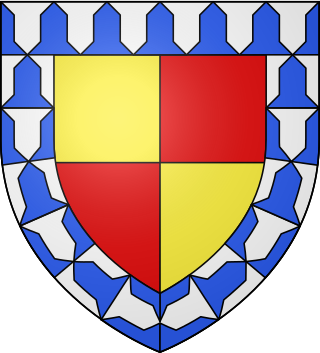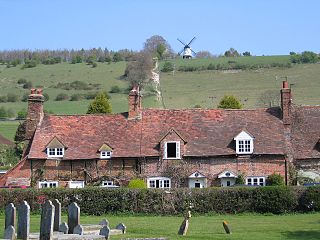The Lord High Chancellor of Ireland was the highest judicial office in Ireland until the establishment of the Irish Free State in 1922. From 1721 to 1801, it was also the highest political office of the Irish Parliament: the Chancellor was Speaker of the Irish House of Lords. The Lord Chancellor was also Lord Keeper of the Great Seal of Ireland. In all three respects, the office mirrored the Lord High Chancellor of Great Britain.

Ferns is a historic town in north County Wexford, Ireland. It is 11.7 km (7.3 mi) from Enniscorthy, where the Gorey to Enniscorthy R772 road joins the R745, both regional roads. The remains of Ferns Castle are in the centre of the town.

John Thomas Mullock was Roman Catholic bishop of St. John's, Newfoundland and did much to establish and develop the church in the region.

The Dean of St Patrick's Cathedral is the senior cleric of the Protestant St Patrick's Cathedral, Dublin, elected by the chapter of the cathedral. The office was created in 1219 or 1220, by one of several charters granted to the cathedral by Archbishop Henry de Loundres between 1218 and 1220.

Denis Brennan is an Irish former Roman Catholic prelate who served as Bishop of Ferns between 2006 and 2021.
Geoffrey de Burgh was a medieval English cleric who was Archdeacon of Norwich (1200–1225), Bishop of Ely and the brother of William de Burgh and Hubert de Burgh, 1st Earl of Kent.

John Baptist Crozier was a Church of Ireland bishop. He served as Bishop of Ossory, Ferns and Leighlin (1897–1907), Bishop of Down, Connor and Dromore (1907–1911), Primate of All Ireland and Archbishop of Armagh (1911–1920).

Walter Branscombe was Bishop of Exeter from 1258 to 1280.

John FitzGeoffrey, Lord of Shere and Justiciar of Ireland was an English nobleman and Crown official.
Patrick Barrett was an Irishman who held religious and secular high offices in Ireland.

John Hoadly was an Anglican divine in the Church of Ireland. He served as Bishop of Ferns and Leighlin, as Archbishop of Dublin, and as Archbishop of Armagh from 1742 until his death.
Arthur Price was Church of Ireland Archbishop of Cashel from 1744 until his death. Previously he had been Church of Ireland Bishop of Clonfert (1724–1730), Ferns and Leighlin (1730–1734) and Meath (1734–1744).

Charles Frederick D'Arcy was a Church of Ireland bishop. He was the Bishop of Clogher from 1903 to 1907 when he was translated to become Bishop of Ossory, Ferns and Leighlin before then becoming the Bishop of Down, Connor and Dromore. He was then briefly the Archbishop of Dublin and finally, from 1920 until his death, Archbishop of Armagh. He was also a theologian, author and botanist.
Thomas Lancaster was an English Protestant clergyman, Church of Ireland Archbishop of Armagh from 1568.
John Garvey (1527–1595) was an Irish Protestant Bishop of Kilmore and Archbishop of Armagh.
Alan la Zouche (1205–1270) was an Anglo-Norman nobleman and soldier of Breton descent. He built the Zouches Manor in Cambridgeshire. He was High Sheriff of Northamptonshire from 1261 to 1266.

Geoffrey de Turville or de Tourville was an English-born judge and cleric in thirteenth-century Ireland, who held office as Bishop of Ossory and Lord Chancellor of Ireland, and was noted as an extremely efficient administrator. His career has been described as an excellent example of what a clerk in the royal service in that era might hope to accomplish.
The Dean of Derry is based at St Columb's Cathedral, Derry in the Diocese of Derry and Raphoe in the Church of Ireland.
Richard of Northampton was an English-born Crown servant, judge and cleric in Ireland of the late thirteenth and early fourteenth centuries, who ended his career as Bishop of Ferns.
Ralph de Norwich (c.1180–1259) was an English-born cleric, judge and Crown servant to King John and King Henry III, much of whose career was spent in Ireland, where he held office as Lord Chancellor of Ireland for several years. He was elected Archbishop of Dublin in 1256, but his election was vetoed by the Pope, on the grounds that despite his clerical office he was essentially a secular official, and too devoted to the King's interests to be a good servant of the Pope.